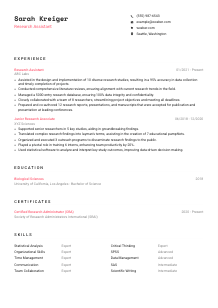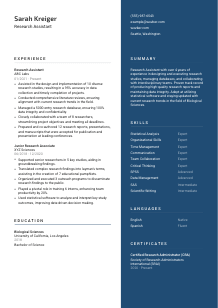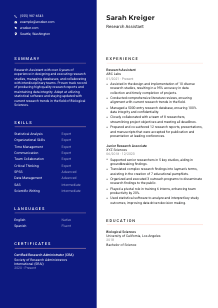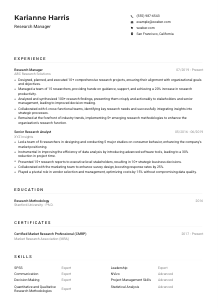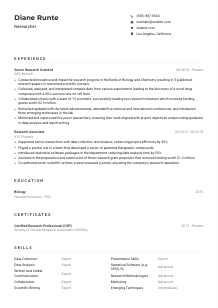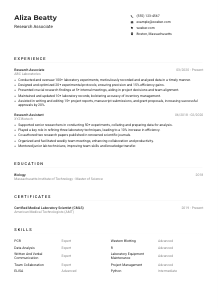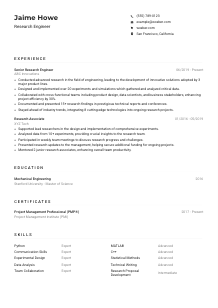Research Assistant Resume Example
Unraveling mysteries, but your resume is still an enigma? Delve into this Research Assistant resume example, pieced together with Wozber free resume builder. It illustrates how to articulate your data-digging skills to sync with job requisites, ensuring your research journey leads straight to a career breakthrough!
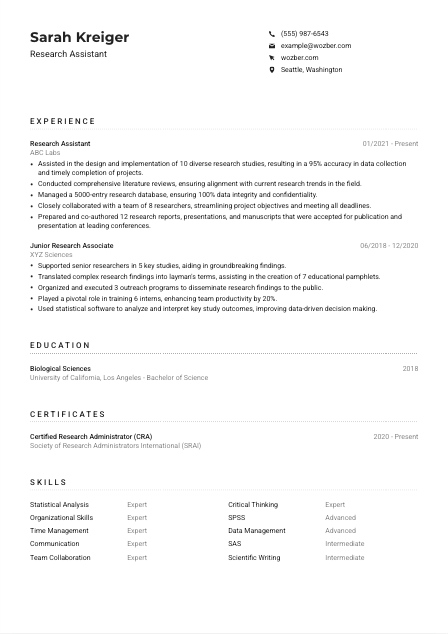
How to write a Research Assistant resume?
Greetings, future Research Assistant prodigy! In your pursuit to navigate the labyrinth of research environments, your resume is your beacon, illuminating your path to standout amidst a sea of candidates. With the aid of Wozber's free resume builder, we're here to steer you through the subtleties of fashioning a resume that's not only tailored to the needs of your desired position but also honed for triumph.
By employing ATS-friendly resume templates and enriching your content through ATS optimization, you're setting yourself up for success. Let's embark on this journey together, transforming your resume into a narrative that propels you toward your career zenith!
Personal Details
Setting the stage for your resume begins with the Personal Details section. This isn't just about your name and contact details; it's your first stride into the spotlight. Let's meticulously craft this frontispiece, ensuring it resonates with the expectations for a Research Assistant position, conforming flawlessly with job prerequisites.
1. Name: Your Professional Marquee
Think of your name as the headline of your professional story. Choose a clear, professional font, granting it prominence. This isn't merely a formality; it's declaring, with confidence, who you are in the professional realm.
2. Job Title: Aligning with Expectations
Immediate clarity on your professional identity is crucial. Align your title directly with the job you're applying for. Position it strategically to catch the eye, letting the hiring manager know, without a shadow of a doubt, that you're tailoring your application for the "Research Assistant" role.
3. Essential Contact Information: Bridging Connections
In this digital age, ensuring a seamless communication pathway is key. Including your phone number and a professional email address (think firstname.lastname@email.com) is non-negotiable. Double-checking for typos here is akin to ensuring all your lab samples are correctly labeled – essential.
4. Location: Strategic Placement
Given this job's requirement for a Seattle, Washington location, stating your location upfront can play to your advantage. It's a simple yet powerful nod to your logistical compatibility with the role, reassuring the employer of your ready availability.
5. Professional Profile: A Glimpse Into Your World
If relevant, tether your LinkedIn or a professional website here. It's like offering a window into your professional ethos before the recruiter even dives into the details. Ensure it's current and mirrors the achievements and skills laid out in your resume.
Takeaway
Your Personal Details section is akin to the opening act of your professional saga. Crafted with thoughtfulness, it lays the foundational stone of your narrative, promising a story worth exploring further. Attention to detail here signals your meticulousness, a trait every Research Assistant must possess.





Experience
The pulsating heart of your resume, the Experience section, is where your story begins to sing. Let's weave through your past roles, metamorphosing them into compelling, research-drenched narratives that reflect a seamless fit for the Research Assistant role you aspire to.
- Assisted in the design and implementation of 10 diverse research studies, resulting in a 95% accuracy in data collection and timely completion of projects.
- Conducted comprehensive literature reviews, ensuring alignment with current research trends in the field.
- Managed a 5000‑entry research database, ensuring 100% data integrity and confidentiality.
- Closely collaborated with a team of 8 researchers, streamlining project objectives and meeting all deadlines.
- Prepared and co‑authored 12 research reports, presentations, and manuscripts that were accepted for publication and presentation at leading conferences.
- Supported senior researchers in 5 key studies, aiding in groundbreaking findings.
- Translated complex research findings into layman's terms, assisting in the creation of 7 educational pamphlets.
- Organized and executed 3 outreach programs to disseminate research findings to the public.
- Played a pivotal role in training 6 interns, enhancing team productivity by 20%.
- Used statistical software to analyze and interpret key study outcomes, improving data‑driven decision making.
1. Dissecting the Job Requirements
Sift through the job description with a fine-toothed comb. Highlight phrases like "assist in the design and implementation of research studies" or "prepare research reports." These aren't just duties; they're guiding lights for crafting your experience narratives.
2. Structure: The Skeleton of Your Story
Organize your experience in a reverse-chronological format, spotlighting your evolution in the research domain. For each role, include your title, the name of the organization, and the timeframe, setting the stage for your accomplishments.
3. Achievement Statements: Your Impact in Action
For each role, articulate how your contributions aligned with or exceeded project objectives. Use action verbs and quantify your achievements. ‘Assisted in the design of 10 research studies' shows precision; it's your empirical evidence of success.
4. Quantification: The Proof Is in the Numbers
Numbers have a universal language – they convey scale, scope, and success. Quantifying accomplishments, like "managed a 5000-entry research database," can provide tangible evidence of your capabilities and impact.
5. Relevance: Keeping It Focused
In the kaleidoscope of your experiences, focus on those colors that match the palette of the Research Assistant's role. Highlight statistical software use, research studies, and collaborative projects, ensuring every line is drenched in relevance.
Takeaway
Your Experience section is a testament to your journey within the research domain. It's where you showcase not just what you've done, but how you've excelled. Let it be a mosaic of achievements that reflects your suitability and enthusiasm for the Research Assistant role.
Education
Your Education section is not just a list of qualifications; it's the bedrock of your expertise, showcasing the academic pathways that have shaped your investigative prowess. Let's ensure this section not only meets the job's educational prerequisites but also underscores your commitment to the field.
1. Locate the Keystone
Isolate the educational requirement from the job description – in this case, a "Bachelor's degree in a related field of study, such as Biological Sciences or Psychology." This isn't just a requirement; it's a key that unlocks the door to potential interviews.
2. Structure: Laying Out the Foundations
Maintain clarity and conciseness. List your highest degree first, followed by the institution's name and your graduation date. This linear clarity makes it easy for the hiring manager to verify your qualifications at a glance.
3. Degree Specifics: Highlighting Your Field
It's crucial that your degree directly aligns with what the role is asking for. For a Research Assistant role focused on Biological Sciences or Psychology, make sure this is front and center in your Education section. It's not just a degree; it's a declaration of your area of expertise.
4. Relevant Courses: Diving Deeper
If early in your career, or if the job is highly specialized, listing significant coursework can underscore your preparedness. Though our example didn't require this step, it's a viable strategy for showcasing niche knowledge in areas directly relevant to the role.
5. Supplementary Educational Achievements
Did you shine in any academically related extracurriculars or undertake notable projects that align with your research aspirations? While not always necessary for more seasoned professionals, these details can enhance the narrative for emerging talents, showcasing a dedication beyond the classroom.
Takeaway
Your Education section is a narrative of your academic journey and commitment to your field. It's not merely listing qualifications; it's showcasing the foundation of your expertise. Ensure it resonates with the job requirements, illustrating you're not only qualified but also deeply passionate about your field.
Certificates
While the job description may not explicitly demand certifications, showcasing relevant certificates can underline your dedication to continuous learning and professional growth in the research field. Let's navigate through selecting and presenting certifications that solidify your candidacy.
1. Sifting Through the Job Description
The job posting might not have listed specific certifications, but let's use our discerning eye to select certifications that carry weight in the research arena. This preemptive alignment showcases your proactive stance on professional development.
2. Strategic Selection: Quality Over Quantity
Choose to display certifications that resonate with the job's demands or elevate your expertise in the research field. A certificate like "Certified Research Administrator (CRA)" directly signals your specialized knowledge and commitment.
3. Chronology and Validity: Staying Current
If your certification has an expiration date, or it's a newly minted achievement, include these dates. This transparency signals to employers that your knowledge is up-to-date, reflecting your pursuit of excellence and relevance in your field.
4. Continuous Learning: The Journey Never Ends
The world of research is ever-evolving. Demonstrate your engagement with ongoing professional development by updating your certifications and seeking out new learning opportunities. It's a testament to your dedication to not just keeping pace, but leading the charge in your field.
Takeaway
Your Certificates section is a showcase of your commitment to excellence and professional development. While not always a requirement, the right certifications can distinguish you as a candidate who goes above and beyond, someone who invests in their growth and expertise.
Skills
The Skills section of your resume is your professional arsenal: a curated collection of capabilities that prove you're not just a good fit for the Research Assistant role – you're an outstanding one. Let's align your skills with the job requirements, ensuring every entry resonates with the tasks at hand.
1. Unveiling the Job Description
Start by combing the job posting for clues on both the hard and soft skills they're prioritizing. Look for mentions of "proficiency in statistical software" or "excellent interpersonal and communication skills." These aren't mere details; they're the keys to your tailored skills list.
2. Skill Matching: Reflecting Your Proficiency
Next, align your existing skills with those listed in the job description. If you're proficient in SPSS or SAS, list it! Similarly, don't forget to include soft skills like teamwork or communication, crucial to the multidisciplinary nature of research roles.
3. Organization: Strategically Structuring Your Arsenal
Resist the urge to list every skill under the sun. Instead, choose those most pertinent to the Research Assistant role. This focused approach not only makes your resume more readable but ensures the hiring manager instantly sees your fit for the role.
Takeaway
Your skills section is a strategic showcase of your professional capabilities. By carefully selecting and aligning your skills with the job requirements, you present yourself as a tailor-made candidate for the Research Assistant position. Let your skills shine as proof of your proficiency and readiness to excel.
Languages
Fluency in different languages positions you as a Research Assistant with a global perspective, offering invaluable insight into multicultural research methodologies or subjects. Let's articulate your linguistic talents in a way that enhances your appeal to potential employers, especially if your research could have international implications.
1. Job Posting Prerequisites
The first step is to verify any specific language requirements stated in the job posting. For instance, "Must have the ability to communicate in English effectively" is not just a prerequisite; it's a non-negotiable skill for communicating within the global research community.
2. Emphasizing Required Languages
Prioritize listing languages explicitly mentioned in the job description, noting your proficiency level. In our case, English would be at the top of your list, potentially followed by any additional languages that could enrich your research capabilities.
3. Additional Languages: Broadening Horizons
Even if not directly mentioned in the job description, highlighting other languages you're proficient in can only enhance your resume. It suggests adaptability and preparedness for projects or collaborations that span across different cultures.
4. Honesty in Proficiency: Clarity is Key
Be clear and honest about your language proficiency levels. Use terms like 'Native,' 'Fluent,' 'Intermediate,' or 'Basic' to describe your proficiency, ensuring expectations are aligned on both ends.
5. Global Scope: Leveraging Language Skill
For roles that have a broader, possibly international scope, your multilingual abilities can set you apart as a candidate capable of engaging with diverse research subjects or collaborators. It's a skill that could potentially elevate your research to a global stage.
Takeaway
Your multilingual abilities are not just personal assets; they're professional tools that can unlock doors to a wide array of research opportunities. Flaunting your language skills can provide you a competitive edge, illustrating your readiness to engage with a globally diverse research landscape.
Summary
The Summary section is your opportunity to encapsulate your professional essence, marketing yourself as not just any Research Assistant, but the one they need. Let's distill your experiences, skills, and ambitions into a narrative that sparks interest and admiration from the get-go.
1. Deciphering the Role
Begin by internalizing the essence of the Research Assistant role. Understand not just the responsibilities but the impact you're expected to make. This foundational awareness is your guide to sculpting a summary that resonates with the heart of the position.
2. Opening Statement: Setting the Stage
Introduce yourself with a statement that reflects both your professional identity and your enthusiasm for research. "Research Assistant with over 4 years of experience" isn't just a fact; it's a declaration of your preparedness and dedication.
3. Addressing Core Skills and Achievements
Zero in on a few key skills and notable achievements from your career, especially those that reflect the job description's demands. This isn't a time for modesty; it's a moment to shine a spotlight on what makes you an exceptional candidate.
4. Brevity: The Soul of Wit
While it's tempting to share every success, the summary should be a teaser, not a tell-all. Aim for a concise yet compelling narrative that invites the hiring manager to dive deeper into the body of your resume.
Takeaway
Your summary is the crescendo of your professional pitch – an invitation to explore the depths of your capabilities and achievements. Tailor it to sing in harmony with the Research Assistant role, making it impossible for the hiring manager not to be intrigued. Remember, this is your first impression; make it count!
Launching Your Research Assistant Journey
Congratulations on navigating through the nuances of crafting a compelling Research Assistant resume. With these guidelines and the support of Wozber's free resume builder, including ATS-friendly resume templates and an ATS resume scanner, you're now equipped to step boldly into the job market. Your resume is a powerful tool in your career arsenal; fine-tune it, infuse it with your unique essence, and let it serve as your beacon as you embark on your next professional adventure.
The realm of research awaits your contributions. Go forth, explorer, and carve your path!

- Bachelor's degree in a related field of study, such as Biological Sciences or Psychology.
- Minimum of 2 years' experience in research methodology and data collection.
- Proficiency in statistical software, such as SPSS or SAS.
- Strong organizational and time management skills with the ability to work in a fast-paced environment.
- Excellent interpersonal and communication skills, both written and verbal.
- Must have the ability to communicate in English effectively.
- Must be located in Seattle, Washington.
- Assist in the design and implementation of research studies, including data collection and analysis.
- Conduct literature reviews and stay updated with current research trends in the field.
- Manage and maintain research databases, ensuring data integrity and confidentiality.
- Collaborate with other research team members and faculty to ensure project objectives are met and deadlines are adhered to.
- Prepare research reports, presentations, and manuscripts for publication and/or presentation at conferences.





